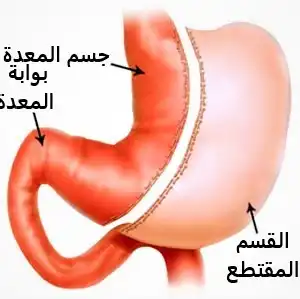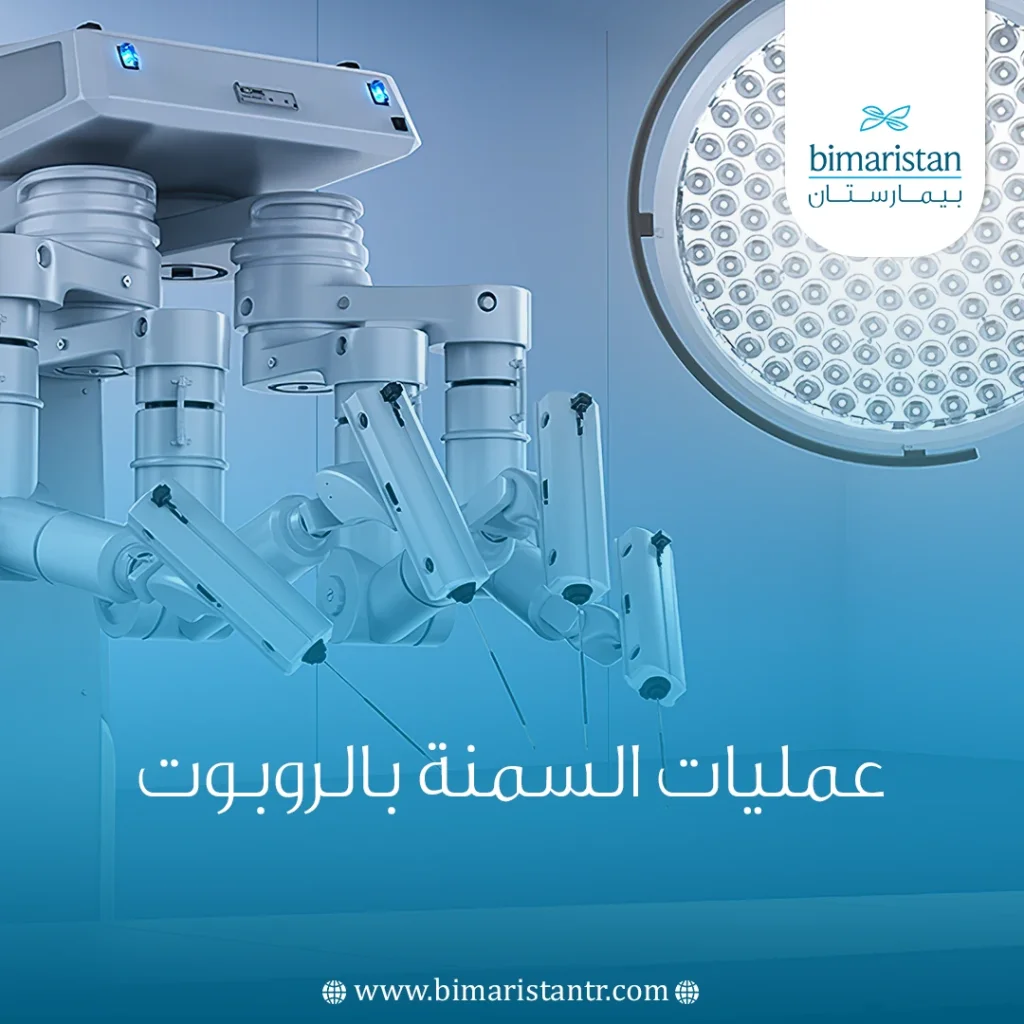قد يمنعك وزنك من الاستمتاع بالحياة على أكمل وجه. وقد تؤدي السمنة إلى خسائر جسدية وعاطفية قد تكون مقلقة حقًا لك ولعائلتك.
وعندما تُترك دون علاج، يمكن أن تؤدي السمنة إلى الإصابة بأمراض القلب والسكري من النوع الثاني وأمراض مزمنة أخرى.
في حال لم تنفعك الحمية والتمارين الرياضية والأدوية وحدها، فقد يكون الوقت قد حان للنظر في خيار آخر عن طريق إجراء عمليات السمنة بالروبوت في تركيا/ اسطنبول.
إذا كنت تفكر في إجراء عملية جراحية، فقد تفاجأ عندما تعلم أن أكثر من 1.3 مليون شخص قد خضعوا لعملية جراحية لعلاج السمنة من عام 2011 حتى عام 2017.
وفقًا لدراسة أجريت على عدد كبير من المرضى، فبعد عام واحد من الجراحة، فقد المرضى الذين خضعوا لعملية تكميم المعدة ما معدله 29.5 بالمائة من إجمالي وزن الجسم، في حين خسر أولئك الذين خضعوا لعملية تحويل مسار المعدة 34.2 بالمائة. يعتبر استئصال المعدة وجراحة (Roux-en-Y) من أكثر جراحات السمنة شيوعًا.
ولكن الجراحة وحدها لا تكفي. يجب عليك اتباع التغييرات الموصى بها من فريق الرعاية الصحية الخاص بك بعد الجراحة لإجراء تغيير دائم.

خيارات عمليات السمنة بالروبوت
هناك العديد من الطرق لفقدان الوزن التي يمكنك استكشافها مع طبيبك، مثل تغيير نظامك الغذائي وممارسة الرياضة والأدوية والجراحة. إذا كنت تفكر في إجراء عملية جراحية، ينبغي أن يناقش الجراح خياراتك معك.
يعمل تكميم المعدة على تقليل حجم معدتك بحوالي 80 بالمائة للحد من كمية الطعام التي يمكن أن تتسع لها.
قد تفقد وزنك لأنه لا يمكنك تناول سوى كميات صغيرة من الطعام.
كما تعمل عملية تحويل مسار المعدة (Roux-en-Y) على تقليل حجم معدتك مع إعادة توجيه الأمعاء الدقيقة لتقليل كمية العناصر الغذائية التي يمتصها جسمك.
قد تفقد الوزن عن طريق تناول كميات أقل من الطعام وامتصاص عدد أقل من العناصر الغذائية، وقد يؤدي كلا الإجراءين إلى تغييرات إيجابية في هرمونات الأمعاء لتقليل الشهية وتحسين الشعور بالشبع.
غالبًا ما يتم إجراء كل من جراحة تكميم المعدة وجراحة تحويل المسار المعدي باستخدام تقنيات قليلة التوغل – إما الجراحة بالمنظار أو الجراحة بمساعدة الروبوت، وربما باستخدام تقنية دافنشي.
حيث يقوم الجراحون بإجراء عمليات جراحية قليلة التوغل بالمنظار أو بمساعدة الروبوت من خلال بضع شقوق صغيرة.
ولإجراء جراحة السمنة بالمنظار، يستخدم الجراحون أدوات خاصة ذات مقبض طويل أثناء عرض الصور المكبرة من منظار البطن (الكاميرا) على شاشة فيديو.
ما هي جراحة إنقاص الوزن الروبوتية؟
يمكن للجراحين المتمرسين لدينا إجراء جراحة السمنة (فقدان الوزن) باستخدام روبوت يسمى نظام دافنشي الروبوتي.
تستخدم الجراحة الروبوتية شقوقًا صغيرة بدلاً من شق كبير في البطن، وبالتالي فهي أقل توغلاً من جراحة السمنة التقليدية.
كيف يتم إجراء جراحة إنقاص الوزن الروبوتية؟
يتم إجراء عمليات السمنة بالروبوت باستخدام نظام دافنشي للجراحة الروبوتية.
روبوت دافنشي هو أداة مساعدة جراحية تمكن جراحي السمنة من إجراء جراحة إنقاص الوزن باستخدام تصور ثلاثي الأبعاد موجه بالكمبيوتر ومكبر.
يقوم الجراح بمناورة الروبوت من خلال شقوق صغيرة في بطن المريض.
باستخدام أربعة أذرع روبوتية، حيث يقوم الجراح بحركات ومن بعدها يقوم الروبوت بترجمة الحركة إلى حركات فائقة الدقة داخل جسمك.
نظام دافنشي الجراحي، هو أداة جراحية متطورة تزود جراحينا المهرة بما يلي:
- دقة جراحية أكبر
- زيادة نطاق الحركة
- براعة محسنة
- التصور المحسن عن الإجراء
- وصول أفضل إلى منطقة الجراحة
للحفاظ على أعلى المستويات الممكنة من الخبرة في العمليات الجراحية الروبوتية، فإن طاقم الجراحين والممرضات وتقنيي الجراحة لدينا مطالبون جميعًا بالحصول على تدريب مستمر صارم وإكمال منهج متخصص في الجراحة الروبوتية.
تعتمد الجراحة الروبوتية كليًا على خبرة الطبيب الجراح.
الروبوت هو مجرد أداة قوية لمساعدتك في الحصول على أفضل عملية جراحية ممكنة بأسرع تعافي ممكن.
من هو الشخص المناسب لجراحة إنقاص الوزن الروبوتية؟

قد يكون المرضى الذين يعانون من السمنة المفرطة مؤهلين للجراحة الروبوتية. تعتبر السمنة مفرطة بالنسبة لأي شخص لديه مؤشر كتلة جسم أكبر من 40. وهذا يشير إلى شخص يزيد وزنه عن 100 رطل.
قد تكون مؤهلا أيضًا إذا كان مؤشر كتلة الجسم لديك يزيد عن 35 بالإضافة إلى حالات طبية مثل مرض السكري أو ارتفاع ضغط الدم.
فوائد الروبوت الجراحي في عمليات السمنة
يمنح نظام دافنشي الجراحي جراحينا رؤية أكبر للمعدة والأعضاء المحيطة، مما يمكنهم من أن يكونوا أكثر دقة والتحكم في أثناء الجراحة.
بدلاً من الجراحة التقليدية المفتوحة أو الجراحة بالمنظار، يسمح نظام دافنشي للجراحين بإجراء العمليات الجراحية بمهارة لمجموعة واسعة من الحالات المعقدة من خلال شقوق تتراوح من 1 إلى 2 سم.
يقدم نظامنا الجراحي الروبوتي العديد من الفوائد.
بما في ذلك:
- انتعاش أسرع
- تقليل الألم والتندب
- عودة أسرع إلى الروتين العادي
- مضاعفات أقل
- أقل صدمة للجسم
- معدلات انتانية أقل كما بينت بعض الدراسات
- فترات إقامة أقصر في المستشفى
- معدل أقل بكثير من تسرب الجهاز الهضمي
- انخفاض خطر الحاجة إلى جراحة متابعة
- نتائج سريرية أفضل (في كثير من الحالات)
مخاطر عمليات السمنة بالروبوت في تركيا
كما هو الحال مع أي عملية جراحية، هناك مخاطر مرتبطة بجراحة إنقاص الوزن الروبوتية. تشمل المخاطر ما يلي:
- نزيف من المنطقة التي أعيد فيها توصيل الأمعاء أثناء الجراحة
- نزيف من منطقة قطع الأمعاء
- جفاف
- نقص التغذية
- انتقال الطعام بسرعة كبيرة من المعدة إلى الأمعاء الدقيقة
التعافي من جراحة إنقاص الوزن الروبوتية
يمكن لمعظم المرضى الذين خضعوا لجراحة السمنة الروبوتية توقع فترة تعافي من أسبوعين إلى ثلاثة أسابيع بعد الجراحة.
وتعتبر الراحة أمر بالغ الأهمية خلال فترة التعافي للسماح لجسمك بالشفاء.
من المهم أيضًا اتباع تعليمات طبيبك بشأن عدد السعرات الحرارية التي يجب أن تستهلكها خلال هذه الفترة.
وكما يجب عدم ممارسة الرياضة خلال فترة التعافي.
تعاون مع جراح السمنة وفريق إنقاص الوزن لوضع خطة لبدء برنامج تمرين تدريجي.
مفاتيح النجاح طويل الأمد لجراحة إنقاص الوزن الروبوتية
من المهم أن تلزم نفسك بأسلوب حياة أكثر صحة بعد أي جراحة لفقدان الوزن.
تتضمن مفاتيح النجاح بعد جراحة إنقاص الوزن الروبوتية ما يلي:
- تناول ثلاث وجبات متوازنة كل يوم – تجنب تناول الوجبات الخفيفة
- شرب الكثير من الماء طوال اليوم
- تناول البروتين مع كل وجبة، ويفضل أن يكون ذلك أولاً – حيث انك ستأكل كمية أقل من الطعام إذا كنت تتناول البروتين أولاً
- ممارسة الرياضة بانتظام

